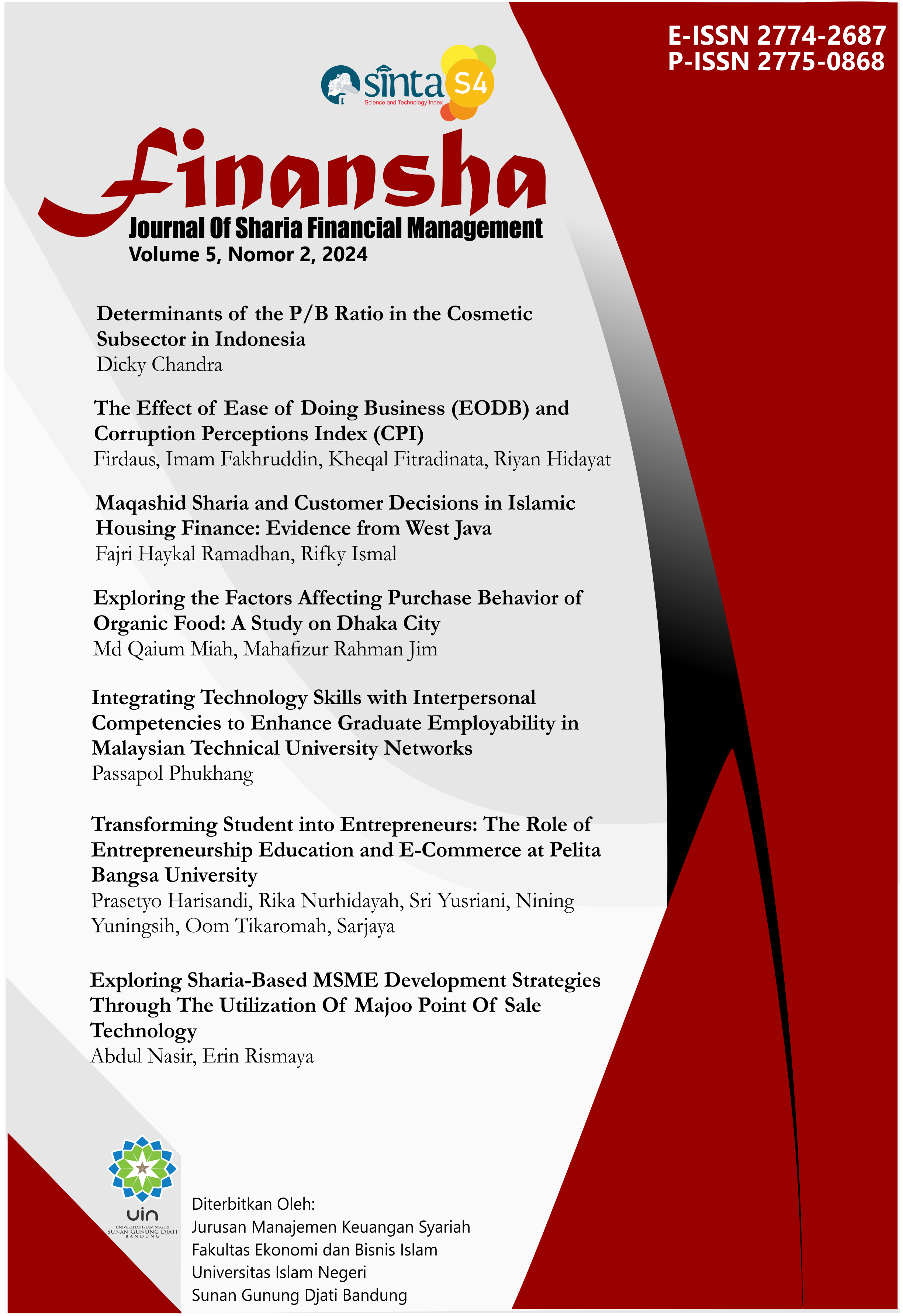TRANSFORMING STUDENT INTO ENTREPRENEURS: THE ROLE OF ENTREPRENEURSHIP EDUCATION AND E-COMMERCE
DOI:
https://doi.org/10.15575/fjsfm.v5i2.40685Keywords:
Entrepreneur Education, Ecommerce, Entrepreneurship Intention, StudentAbstract
References
Aprilianty, E. (2012). Pengaruh Kepribadian Wirausaha, Pengetahuan kewirausahaan, dan Lingkungan Terhadap Minat Berwirausaha Siswa SMK. Jurnal Pendidikan Vokasi, 03(3), 311–324.
Bae, T. J., Qian, S., Miao, C., & Fiet, J. O. (2023). The relationship between entrepreneurship education and entrepreneurial intentions: A meta-analytic review. Entrepreneurship Theory and Practice.
Bagheri, A., & Pihie, Z. A. L. (2014). he moderating role of gender in shaping entrepreneurial intentions: Implications for vocational guidance. International Journal for Educational and Vocational Guidance, 14(2), 227–243.
Chiu, C. M., Wang, E. T. G., Fang, Y. H., & Huang, H. Y. (2014). Understanding customers’ repeat purchase intentions in B2C eâ€commerce: The roles of utilitarian value, hedonic value and perceived risk. Information Systems Journal, 24(1), 85–114.
Fayolle, A., & Gailly, B. (2015). The impact of entrepreneurship education on entrepreneurial attitudes and intention: Hysteresis and persistence. Journal of Small Business Management, 53(1), 75–93.
Gibb, A. A. (2002). In pursuit of a new ‘enterprise’ and ‘entrepreneurship’ paradigm for learning: creative destruction, new values, new ways of doing things, and new combinations of knowledge. International Journal of Management Reviews, 4(3), 233–269.
Harisandi, P., Rabiatul Hariroh, F. M., & Zed, E. Z. (2023). Media Sosial, Pendidikan Kewirausahaan Berdampak terhadap Minat Berusaha Dimensi oleh Inovasi Mahasiswa di Cikarang. Jurnal Pendidikan Dan Kewirausahaan, 11(3), 784–802. https://doi.org/10.47668/pkwu.v11i3.852
Harisandi, P., Sari, M., & Yulandri, E. (2023). MARKET MICROSTRUCTURE AND FINANCING EFFICIENCY IN MSMES IN INDONESIA: COMPARISON OF SHARIA AND CONVENTIONAL SECTORS. Finansha: Journal of Sharia Financial Management, 4(2), 160–175. https://doi.org/10.15575/fjsfm.v4i2.30801
Henderson, R., & Robertson, M. (2000). Who wants to be an entrepreneur? Young adult attitudes to entrepreneurship as a career. Career Development International, 5(6), 279–287.
Kang, J., & James, J. (2007). Revisiting the concept of brand loyalty: A congruity-based approach. . Journal of Brand Management, 14(5), 405–421.
Kaplan, A. M., & Haenlein, M. (2010). Users of the world, unite! The challenges and opportunities of social media. Business Horizons, 53(1), 59–68.
Kim, D. J., Ferrin, D. L., & Rao, H. R. (2009). Trust and satisfaction, two stepping stones for successful e-commerce relationships: A longitudinal exploration. Information Systems Research, 20(2), 237–257.
Laudon, K. C., & Traver, C. G. (2018). E-commerce: business, technology, society. Pearson.
Liñán, F., & Chen, Y. W. (2009). Development and cross-cultural application of a specific instrument to measure entrepreneurial intentions. Entrepreneurship Theory and Practice, 33(3).
Liñán, F., RodrÃguez-Cohard, J. C., & Rueda-Cantuche, J. M. (2015). Factors affecting entrepreneurial intention levels: A role for education. Nternational Entrepreneurship and Management Journal, 7(2), 195–218.
Nabi, G., Liñán, F., Fayolle, A., Krueger, N., & Walmsley, A. (2017). The impact of entrepreneurship education in higher education: A systematic review and research agenda. Academy of Management Learning & Education, 16(2), 277–299.
Nabi, G., Walmsley, A., Liñán, F., Akhtar, I., & Neame, C. (2018). Does entrepreneurship education in the first year of higher education develop entrepreneurial intentions? The role of learning and inspiration. . Studies in Higher Education, 43(3), 452–467.
Piperopoulos, P., & Dimov, D. (2015). Burst bubbles or build steam? Entrepreneurship education, entrepreneurial self-efficacy, and entrepreneurial intentions. Journal of Small Business Management, 53(4), 970–895.
Rahayu, R., & Day, J. (2015). Determinant factors of e-commerce adoption by SMEs in developing country: Evidence from Indonesia. Procedia - Social and Behavioral Sciences, 195, 142–150.
Shapero, A., & Sokol, L. (1982). The social dimensions of entrepreneurship. Encyclopedia of Entrepreneurship, 72–90.
Souitaris, V., Zerbinati, S., & Al-Laham, A. (2007). Do entrepreneurship programs raise entrepreneurial intention of science and engineering students? The effect of learning, inspiration and resources. Journal of Business Venturing, 22(4), 566–591.
Supriaman, S. (2019). KEPRIBADIAN WIRAUSAHA, PENGETAHUAN KEWIRAUSAHAAN, DAN LINGKUNGAN KELUARGA TERHADAP MINAT BERWIRAUSAHA PADA MAHASISWA POLITEKNIK LP3I JAKARTA. In Jakarta Gedung sentra Kramat Jl. Kramat Raya (Vol. 8, Issue 1).
Turban, E., King, D., Lee, J. K., Liang, T. P., & Turban, D. C. (2015). Electronic commerce: A managerial and social networks perspective. Springer.
Zhang, X., & Huang, Y. (2023). The impact of e-commerce on entrepreneurial intentions in digital natives. Journal of Business Research, 113(124), 161.
Downloads
Published
How to Cite
Issue
Section
Citation Check
License
Authors who publish with this journal agree to the following terms:
- Authors retain copyright and grant the journal right of first publication with the work simultaneously licensed under a Creative Commons Attribution License that allows others to share the work with an acknowledgment of the work's authorship and initial publication in this journal.
- Authors are able to enter into separate, additional contractual arrangements for the non-exclusive distribution of the journal's published version of the work (e.g., post it to an institutional repository or publish it in a book), with an acknowledgment of its initial publication in this journal.
- Authors are permitted and encouraged to post their work online (e.g., in institutional repositories or on their website) prior to and during the submission process, as it can lead to productive exchanges, as well as earlier and greater citation of published work (See The Effect of Open Access).

















